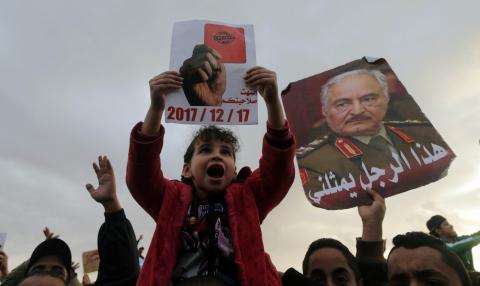Advertisement
Case of commander wanted by ICC opens rift in east Libyan forces
TUNIS (Reuters) - Uncertainty over the status of a Libyan commander wanted by the International Criminal Court has opened a rift between military leaders who detained him for questioning, and fighters who staged protests to force his release.
The Hague-based ICC indicted Mahmoud al-Werfalli, a special forces commander, last August in connection with dozens of summary executions but he remains in Libya where he has been accused of further killings.
His case has exposed one of the faultlines in forces led by General Khalifa Haftar, which are based in eastern Libya, as they push to extend their control in the south and west of the divided oil producing nation.
Werfalli is wanted over the killings of more than 30 captives during a campaign by Haftar's Libyan National Army (LNA) against Islamists and other opponents in the eastern city of Benghazi. He serves in a unit attached to the LNA, which played a leading role in the campaign.
The allegations are awkward for Haftar, who has courted foreign governments and the United Nations after gradually consolidating his military position in eastern Libya and emerging as the most prominent contender to lead the country.
Reports of new killings emerged in January as Haftar received U.N. Libya envoy Ghassan Salame at his headquarters in Rajma, near the city of Benghazi. The U.N.'s Libya mission said both men had "emphasized the importance of holding elections in 2018", polls which Haftar has signaled he would contest.
Images surfaced appearing to show Werfalli shooting dead 10 blindfolded prisoners outside a mosque in retaliation for a twin car bombing.
Two weeks later, military sources said he had handed himself in at the LNA headquarters for questioning, leading supporters to block roads in Benghazi in protest. Werfalli was released the same night, before returning to Rajma where he has stayed for the past few weeks as military police investigate him, military sources say.
LNA spokesman Ahmed al-Mismari said Werfalli had been released on bail after the first part of the investigation. Werfalli would not be handed over to the ICC, he said, because of the "integrity and strictness" of the Libyan justice system.
Interpol issued a red notice for Werfalli's arrest late last month.
DISPARATE BRIGADES
Analysts say the episode also shows the limits of Haftar's control over parts of the LNA, which drew in disparate brigades including ultraconservative Salafists in the "Dignity Operation" that it launched in Benghazi in 2014.
Restoring order and ending chaos is a constant theme in Haftar's speeches.
Special forces head Wanis Boukhamada is a popular figure and Werfalli himself has a loyal following. Last week, friends of Werfalli released a video statement demanding information about his detention.
"This person is a hero, a savior and a symbol of Dignity (Operation)," a man reading the statement said. "If you detain him for killing terrorists, why do you not also detain the pilots and the artillery and the Salafists and everyone who participated in Dignity?"
At a meeting with Boukhamada and other special forces commanders last month, Haftar said Werfalli's case was "a national case, and the nation is greater than any court", according to several sources present.
Last week, Boukhamada had to intervene personally to persuade Werfalli supporters who had closed Benghazi roads for a second time to end their protest.
"The (LNA) general command need to release Mahmoud al-Werfalli immediately, Mahmoud killed Daesh (Islamic State) members, not innocent people," one of the protesters said.
(Writing by Aidan Lewis; editing by David Stamp)



















Add new comment